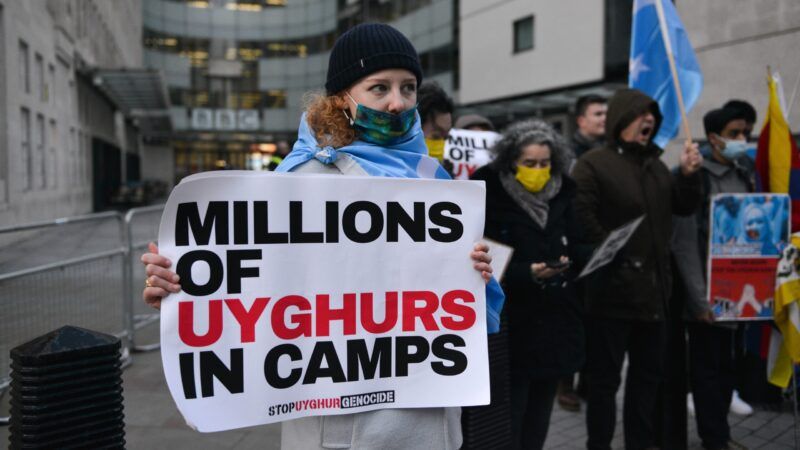The U.S. Immigration System Needs To Do More To Help Uyghurs
Their immigration struggles are indicative of broader issues in America’s refugee and asylum infrastructure.

The world has known for years now that Uyghurs, members of a Turkic ethnic group who number about 13.5 million and mostly live in China, are experiencing persecution by the Chinese government. A number of international observers and human rights advocates argue the Chinese government is attempting genocide, but Uyghurs looking for an escape from China's brutality have had a difficult time securing relief through America's refugee and asylum pathways, and their immigration struggles are shared by far too many vulnerable people seeking an escape to the United States.
Under U.S. immigration law, asylum seekers are people who are already present on American soil or at a port of entry and apply for the right to remain in the country. Refugees, on the other hand, apply for resettlement in the U.S. from abroad. Approval to stay in the U.S. under either category requires that applicants prove they have been "persecuted or fear persecution due to race, religion, nationality, political opinion, or membership in a particular social group." The two pathways are intended to help the world's most vulnerable people escape danger.
In the past two fiscal years, however, the U.S. has admitted zero Uyghur refugees. Many Uyghurs who have been lucky enough to reach the U.S. through other pathways, like student and travel visas, also face an uncertain future—as Caroline Simon reported for Roll Call yesterday, there are "roughly 800 Uyghurs caught in the backlog of hundreds of thousands seeking asylum in the U.S." Until they receive asylum, they can't apply to sponsor stranded family members.
It's undeniable that Uyghurs broadly fall into the categories outlined for refugees and asylum seekers. In the name of cultural erasure, they've been subject to mass sterilization, kept from speaking the Uyghur language, and forced to pledge loyalty to the Chinese Communist Party. Adrian Zenz, senior fellow in China studies at the Victims of Communism Memorial Foundation, told NPR that China's treatment of Uyghurs is "probably the largest incarceration of an ethnoreligious minority since the Holocaust."
Tursunay Ziyawudun, a Uyghur woman interviewed by Reason's Noor Greene, recounted that "she spent 11 months in jail for no stated reason." Ziyawudun was arrested because of her ethnic background; in detention camps, she was tortured with electric equipment, beaten, and raped. The United Nations estimates that up to 1.5 million Uyghurs may be in Chinese internment camps, potentially facing the same treatment as Ziyawudun.
Despite well-documented and widely decried persecution, very few Uyghurs seeking sanctuary in the U.S. have secured approval to settle here. That's partially a result of where they're coming from. As Time magazine reports, "It's next to impossible for Uyghurs in China, most of whom are under extraordinary state surveillance, to access refugee resettlement systems."
Still, the State Department "says Uyghurs outside of China are currently able to access the refugee resettlement program." Though the agency doesn't publicly disclose how many applications are being processed, an estimated 1–1.6 million Uyghurs live outside China. "There are thousands of Uyghur refugees around the world who may be returned to China…if deported," Tahir Hamut Izgir, a Uyghur asylum seeker in the U.S., told Voice of America.
The disappointing immigration relief for Uyghurs comes on the heels of a whole lot of political talk. Congress previously passed the Uyghur Human Rights Policy Act of 2020, which imposed sanctions on "individuals and entities responsible for human rights abuses" against Uyghurs. Both the Trump and Biden administrations have referred to China's persecution of Uyghurs as a genocide. Just last month, the Biden administration announced a diplomatic boycott of the Beijing Winter Olympics, citing China's "egregious human rights abuses and atrocities in Xinjiang," the nominally autonomous region within China where the majority of the country's Uyghurs live. Not long before that, the Biden administration recommended that at-risk Uyghurs receive priority access to U.S. refugee resettlement.
The plight of the Uyghurs waiting on immigration answers points to broader issues in America's refugee and asylum infrastructure. For one, the U.S. has been taking in astonishingly low numbers of refugees lately, hitting a record low of 11,411 in fiscal year 2021. Over 667,000 asylum seekers are waiting for their cases to be resolved, and they face an average wait time of around 1,600 days, or 54 months. There's also the issue of the "last-in, first-out" policy, under which asylum applicants who have arrived in the U.S. more recently are processed first. This means many people who have been present in the U.S. for years cannot petition for visas for family members, which propagates what the Center for Migration Studies of New York calls "the 'other family separation' crisis."
Immigration relief for Uyghurs has enjoyed a fair deal of bipartisan support, with figures like Sen. Marco Rubio (R–Fla.) saying that "they probably have the most compelling case in the world right now for asylum." But thousands of vulnerable people around the world could benefit if reforms proposed for Uyghurs—like quicker case adjudication and prioritizing applications from those most at risk—were applied more widely across the U.S. immigration system.
"I'm thankful that people care about what's happening to my people," Ziyawudun told Reason. "But I wish there was some kind of practical thing that could be done. Just speed up. Whatever you've been doing, just speed it up." While immigration relief alone won't solve the plight of the Uyghurs, speeding up those processes is something that the U.S. government should prioritize—and that sense of urgency should guide how we process other vulnerable people seeking refuge here.


Show Comments (50)